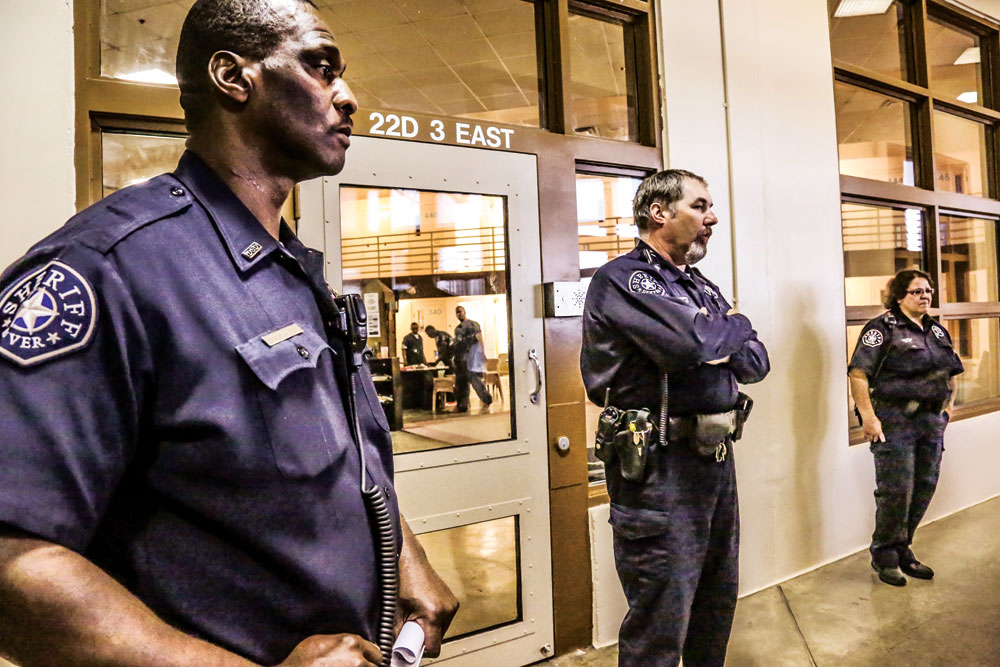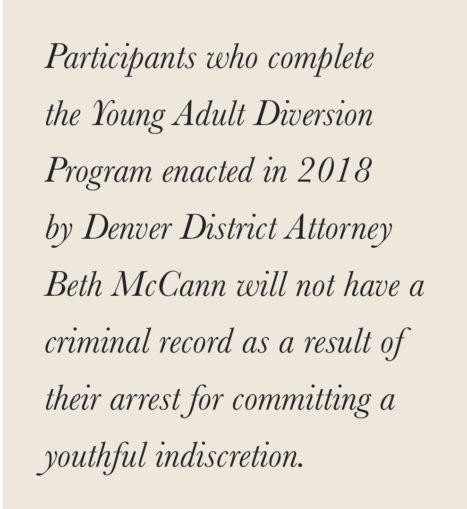
District Attorney Beth McCann implemented a young adult diversion program in May 2018 to put eligible young adult offenders on track for a future without incarceration. A juvenile diversion program was authorized by a Colorado statute in 1974. This Front Porch file photo from 2015 was taken at the Denver County Jail on Smith Road adjoining the Stapleton neighborhood.
A majority of Americans believe that our criminal justice system needs reform. Since taking office in 2017, Denver District Attorney (DA) Beth McCann has been in a unique position to do just that. “We have made some progress I believe,” she says, citing in particular her office’s efforts to establish alternatives to jail in certain cases, especially where mental health, substance abuse, and youth are key factors.
Young adults, defined here as those ages 18 to 26, are in the middle of a tremendous phase of brain development, especially in the prefrontal cortex. This is where rational thought, judgement and impulse control are centered.

DA Beth McCann would like to expand her office’s young adult diversion program, which allows “felony offenders” ages 18-26 who meet strict eligibility conditions to work with a case manager and get therapy, take classes, and take responsibility for their actions.
In May 2018, McCann introduced the “Young Adult Diversion” program that offers an alternative to jail for young adults without a prior felony who have committed crimes that do not involve a victim (such as criminal trespass, drug possession, forgery, and shoplifting). Those successfully completing the program will not have a criminal record as a result of their arrest for committing a youthful indiscretion. The criteria for being in the program are very stringent, however, and participants must accept responsibility for their actions to be eligible.
When someone is arrested, they are taken to court—and they generally see a judge within 24 hours, says McCann. The DA’s office examines incoming cases and “we have an intake person there every day to help do an intake on the potential person who might be a good client for diversion.”
 Since May 2018, 84 individuals have been accepted into the program. To date, 41 of this group have “successfully terminated,” only one of whom again committed a crime. Five “terminated unsuccessfully,” meaning that they did not complete the program. The remaining 38 are still actively participating in the program. McCann is encouraged by early results and believes diversion is much more successful than probation, which doesn’t include the individualized attention, life management skills and other elements that young adult diversion includes.
Since May 2018, 84 individuals have been accepted into the program. To date, 41 of this group have “successfully terminated,” only one of whom again committed a crime. Five “terminated unsuccessfully,” meaning that they did not complete the program. The remaining 38 are still actively participating in the program. McCann is encouraged by early results and believes diversion is much more successful than probation, which doesn’t include the individualized attention, life management skills and other elements that young adult diversion includes.
The case manager ratio is also much smaller than for those on probation, with a ratio of one case manager to about 25-30 clients versus a probation officer’s typical caseload of over 100. Case managers evaluate risk factors for each client, such as family life and substance abuse, and they design an individualized program. “So if it’s someone who’s in for drugs, they figure out, ‘Is this a person that can really benefit from substance abuse treatment?…Do they need help with getting a job? Do they need help with how to do a resume?’ You know, it’s not all about just reporting to your probation officer.”
For McCann, the post-program participation surveys offer poignant evidence of success that mere data can’t reflect. When asked, “What ways have you repaired the harm you caused the victim?” one participant responded, “I have repaired myself by knowing who I should have and shouldn’t have in my life.” When queried how the program had impacted their view of themselves, another wrote, “Honestly, I’ve grown to see my own light.” McCann cites one participant who earned a real estate license during the program; another was able to continue training in the medical field, a prospect that a criminal record would have jeopardized.
McCann would like to expand the young adult diversion program to include more types of offenses, citing budget constraints among the reasons for its limited reach. City Councilwoman Robin Kniech, when asked by Front Porch, expressed support for diversion programs “and other criminal justice reforms that seek to provide support and services to get at the root causes that can prevent crime rather than a system of punishment through incarceration that has proven ineffective and racially biased.” Neither Kneich nor Councilman Chris Herndon had heard any concerns from their constituents about diverting rather than punishing in these circumstances.
McCann is part of a national movement of reform prosecutors who are advancing common-sense and compassionate reforms to course-correct the “get tough on crime” philosophy that resulted in mass incarceration. For example, McCann says she is committed to addressing the racial disparities baked into the criminal justice system and cites a new race and justice project that her office has launched to ensure prosecutions are fair. By advancing community-oriented and prevention approaches, DA McCann believes her office can promote a smarter and more equitable system of justice for all Denverites.
Perceptions of how just the criminal justice system actually is differ widely by race in the U.S. A 2019 Pew Research Center study found that though a majority of Black and White Americans believe the justice system is inequitable, the groups have “widely different perceptions of how blacks are treated in America, but majorities of both groups say blacks are treated less fairly than whites by the criminal justice system (87% of blacks vs. 61% of whites) and in dealing with police (84% vs. 63%, respectively).”
With a keen perspective from inside the criminal justice system, McCann does not equivocate when she cites the need for reform. “Probation and possible prison sentence in terms of racial injustice and the over-representation of people of color in the system” remain areas where McCann hopes to do more. “I think we have a lot to do. I think we are making some progress, but it’s challenging and it involves not just the criminal system. Reform also means addressing issues like poverty and education.”



0 Comments